Memories are something amazing. For some you think about them in your mind and they play for you like a movie. If the event had a significant impact on you, you can remember almost everything regarding it: the weather, the conversations during it, any music that may have been playing. You might even remember yourself…in third person. Which of course is inaccurate. How can you imagine yourself in third person? It seems unlikely that memories that seem more vivid and accurate aren’t so, but more often than not, this is the case.
I have a few memories like that, an example of one is first time I got to see my little brother. I remember it like it was yesterday:
My auntie came to pick me up from school, which was unusual. Usually my mom came to get me. I remember that it was a warm day, and that I had my sweater tied around my waist as we walked down the street. I noticed that we weren’t taking the usual way route home so I questioned we where we going. My auntie told me that it was a surprise. She dropped me off with my stepfather who was waiting with my 3 older step-siblings. We all went to the hospital to see my new brother. When we got to my mother’s room I gave her kisses and a hug and promptly flipped back the curtain to see if my brother was on the other side. I asked her “mommy, where’s your baby at?” and my entire family looked at me in collective confusion (they also laughed). “TJ, your brother’s right there” “Where?”, now my mom looked at me with concern “TJ, don’t you see your brother laying there?”. She gestured towards the baby in the basinet towards her feet. And I had seen the baby, I looked down at him momentarily before checking behind the curtain. I looked at my mother in her eyes and told her “Na-uh, that’s not my brother because that baby is white!” (my family and I are all black).
That story has been told time and time again from various perspectives, at various family functions, and at varying levels of soberness. Which just causes me to question, “how accurate is my memory?”. I was only 6 when my little brother was born, and I’m sure I’ve heard the story hundreds of times. Is my memory the memory of what actually happened? Or a smorgasbord of all the retellings I’ve heard over the years. Human memories are known to be imperfect. Yet, we still count on our memories to help the law catch criminals and to help us save lives. I think that the narrative rehearsal hypothesis (Goldstein, 2011) can be used to explain why my memory seems so accurate to me. Because of my family’s retelling of the event, sometimes with the added photos taken in the hospital room, I have most likely concocted my own version of what really happened that that. I find it so interesting the faith we have in our memories knowing that they can be faulty.
Goldstein, E. B. (2011). Memory for “Exceptional” Events . In E. B. Goldstein, Cognitive Psychology (pp. 208-213). Belmont: Wadsworth.

